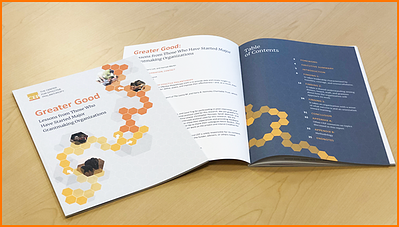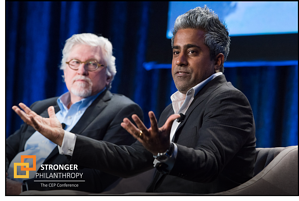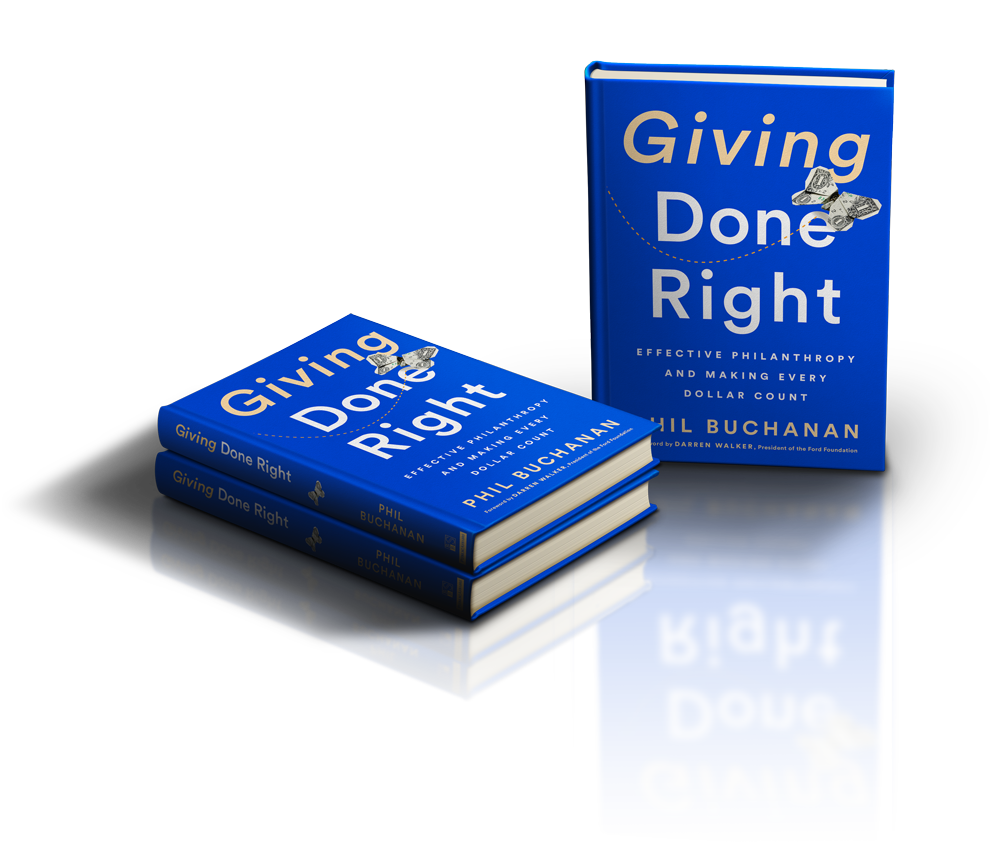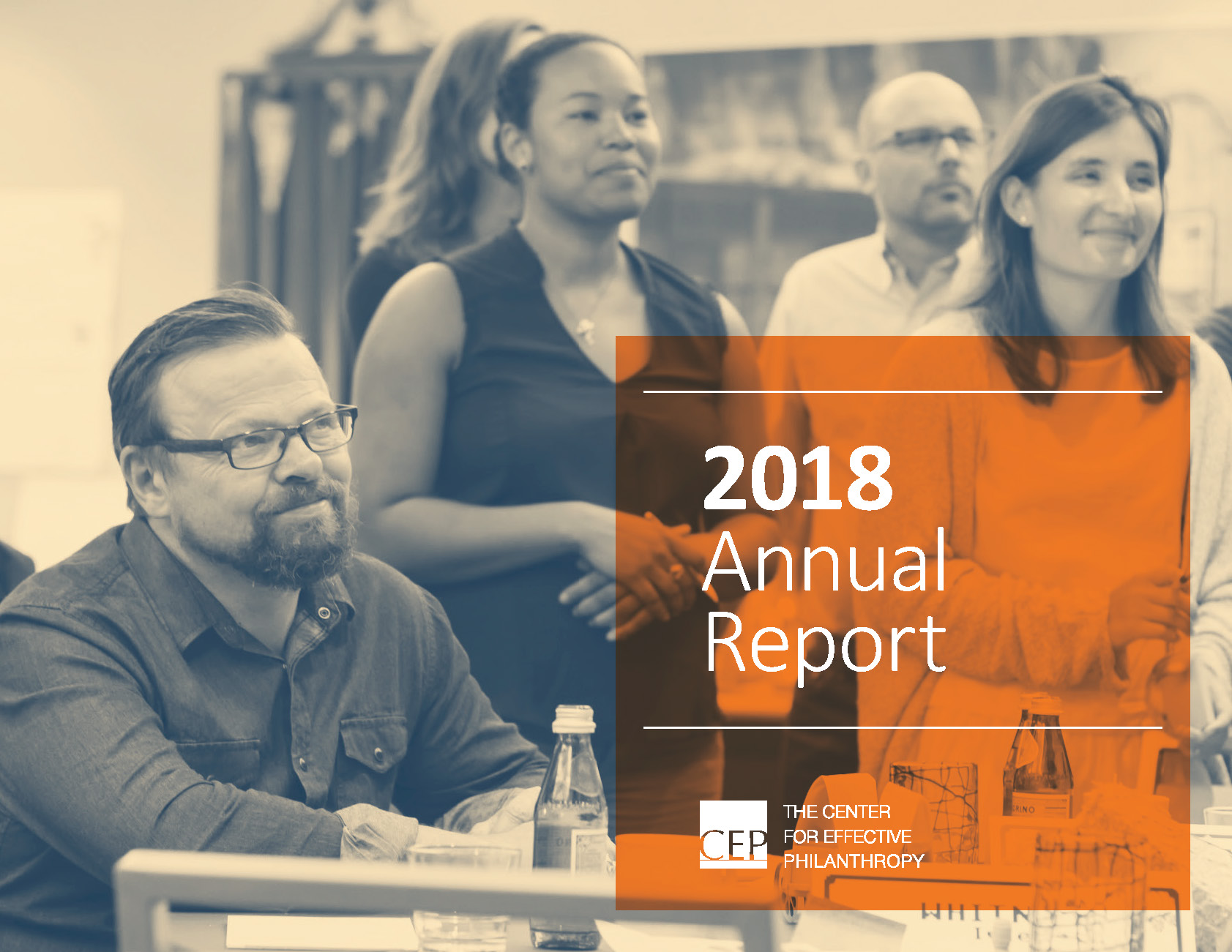Greater Good Reveals What It Takes for Early-Stage Grantmakers to Get Off the Ground
 With more than 30,000 new private U.S. foundations established in the past 20 years, and with the rise of funding vehicles like DAFs and LLCs, it’s vital that early-stage grantmakers learn from the wisdom of those who have gone before them so they can avoid common mistakes and position their grantmaking organizations for success.
With more than 30,000 new private U.S. foundations established in the past 20 years, and with the rise of funding vehicles like DAFs and LLCs, it’s vital that early-stage grantmakers learn from the wisdom of those who have gone before them so they can avoid common mistakes and position their grantmaking organizations for success.
To help with this, CEP recently published Greater Good: Lessons from Those Who Have Started Major Grantmaking Organizations, a resource that offers guidance for early-stage grantmakers getting their organizations off the ground. Based on interviews with leaders of 14 grantmaking organizations that were established, or that experienced significant growth, in the past 20 years and that hold at least $350 million in assets, the report distills insights for a new wave of philanthropic leaders seeking to build thriving grantmaking organizations.
While there is no single blueprint for those new to philanthropy to follow, across those interviews, three key elements for effectively getting grantmaking organizations up and running emerged: 1. Leadership characterized by humility, courage, and resourcefulness; 2. Shared understanding among donors, board, staff, and grantees about how the organization will approach its work; and 3. An organization with a sense of what success is and an orientation toward learning. While these elements are applicable to grantmakers at any stage of their organization’s life cycle, they are particularly important for those in the early stages of building their organizations.
This research was supported by the Leona M. and Harry B. Helmsley Charitable Trust, which marks its 10th year of grantmaking this year. Helmsley also sponsored a session discussing the research at the 2019 CEP Conference in Minneapolis last month.
On the CEP blog, a number of foundation leaders have reflected on the report’s insights and their own organizations’ respective stories of their start-up stages.
- Helmsley Charitable Trust CEO Stephanie Cuskley calls the report a “long-overdue guide for new philanthropic organizations.”
- Pam Foster, chief operating officer of Co-Impact, makes the case for collaboratives as an effective tool for new philanthropies.
- Jen Rainin, CEO of the Kenneth Rainin Foundation, describes how the Foundation’s experiences getting started align with the three key elements the study identifies.
- Darin McKeever, president and CEO of the William Davidson Foundation, shares the Foundation’s story of going “from zero to sixty.”
CEP’s hope is that the insights in this report will help those now in the early days of their philanthropy — and the ensuing generation of givers in the years to come — avoid common mistakes and most effectively support nonprofit organizations and leaders doing critically important work on the ground.
You can download the report for free here.
CEP’s 2019 Conference Connects, Energizes, Inspires
 Nearly 500 foundation CEOs, senior leaders, and trustees came together at Stronger Philanthropy, the 2019 CEP Conference, in Minneapolis last month for three days filled with inspiring stories, new data and insights, and sharp discussion of issues that are central to funders’ ability to maximize their impact.
Nearly 500 foundation CEOs, senior leaders, and trustees came together at Stronger Philanthropy, the 2019 CEP Conference, in Minneapolis last month for three days filled with inspiring stories, new data and insights, and sharp discussion of issues that are central to funders’ ability to maximize their impact.
It was a packed few days in the Twin Cities. Highlights included an interactive opening plenary from political philosopher and bestselling author Michael Sandel about the role of values in a world increasingly dominated by money and a market economy; an enthralling conversation between Anand Giridharadas, author of Winners Take All: The Elite Charade of Changing the World, and former Microsoft executive and co-founder of the Raikes Foundation, Jeff Raikes, about the critiques surrounding mega philanthropy and the role of power and money in solving societal problems; and a powerful plenary about the housing crisis in America in which Pulitzer Prize-winning author and sociologist Matthew Desmond shared sobering data and insights, and Tecara Ayler and Luis Caguana of Minneapolis-based tenants’ rights advocacy group Inquilinxs Unidxs Por Justicia (United Renters for Justice) shared their personal stories of renter abuse and eviction.
These were a few among many thought-provoking plenaries, panels, and breakout sessions at the conference.Hoping to revisit moments from the conference? Couldn’t join us and want to see what you missed? You can now watch video of several plenaries — including a panel on the nexus of philanthropy and public policy featuring new CEP research, a discussion of philanthropy’s role in moving beyond political divisions with law and religion scholar John Inazu, and an incisive and hilarious plenary with comedian and CBS Sunday Morning commentator Nancy Giles — on CEP’s YouTube channel.
You can also catch up on major themes of the conference through a number of posts on the CEP blog.
- CEP’s Sarah Martin put together comprehensive recaps of each of the three days of the conference, featuring thoughts and reactions from attendees and livestream viewers via Twitter.
- Community Wealth Partners Senior Director of Knowledge and Content Lori Bartczak discusses the need for funders to share power with the communities they serve, describing how the stories that several grantmakers shared at the conference left her reenergized and with belief that “there are places where the ivory tower seems to be coming down, even if it’s one brick at a time.”
- Brenda Solorzano, chief executive officer of Headwaters Foundation, also focuses on putting communities in the driver’s seat as a key theme of the conference.
- Melinda Tuan, managing director of Fund for Shared Insight, reflects on how the conference elevated the voices of those who are least heard — and why it is so vital for funders to listen to those voices and act on what they hear.
- In another post focused on the conference’s central theme of listening, Communities Foundation of Texas Chief Philanthropy Officer Sarah Cotton Nelson digs into the differences between “listening-but-not-really-hearing” and the power of true, meaningful listening.
- Jasmine Sudarkasa, program fellow for the Effective Philanthropy Group at the William and Flora Hewlett Foundation, reflects on her experience at the conference as someone who is new to the philanthropic sector, sharing how the three days shaped her perception of what philanthropic effectiveness entails.
- Anna Cruz, strategic learning and evaluation officer at the Kresge Foundation, breaks down the process of shifting philanthropic practices to incorporate a racial equity lens, and reflects on a conversation on the topic at a breakout session at the conference.
- And BoardSource CEO Anne Wallestad shares key themes that emerged from a breakout session she led on the critical partnership between foundation CEOs and boards.
Conference speakers and attendees shared thoughtful reactions and takeaways on other platforms as well. In a thoughtful column for Forbes, Raikes reflects on his conversation with Giridharadas at the conference, keying in on a thread about zero-sum thinking and what it means for how power is aggregated and shared. Other reflections include a post from Hilary Pearson on the Philanthropic Foundations Canada blog and a collective reflection from Arabella Advisors staff who attended the conference, on the Greater Good blog.
Stay tuned — and be sure to have your colleagues sign up for our newsletter — to not miss any news or announcements about CEP’s 2021 conference in Houston!
Share Giving Done Right with Your Board, Staff, and Donors
 Giving Done Right: Effective Philanthropy and Making Every Dollar Count by CEP President Phil Buchanan is making waves in both mainstream and philanthropic media since its publication in April, including in outlets such as The New York Times, Vox, Fast Company, Wired, The Financial Times, The Chronicle of Philanthropy, andSalon, to name a few. Buchanan has also appeared on podcast and radio segments including on several local NPR affiliates and Bloomberg Businessweek Radio. Check out this page for links to the latest Giving Done Rightnews.
Giving Done Right: Effective Philanthropy and Making Every Dollar Count by CEP President Phil Buchanan is making waves in both mainstream and philanthropic media since its publication in April, including in outlets such as The New York Times, Vox, Fast Company, Wired, The Financial Times, The Chronicle of Philanthropy, andSalon, to name a few. Buchanan has also appeared on podcast and radio segments including on several local NPR affiliates and Bloomberg Businessweek Radio. Check out this page for links to the latest Giving Done Rightnews.
Over the past few months, Buchanan has also been on the road and in conversation with many philanthropic leaders across the country discussing why nonprofit leaders are unsung heroes doing vital work in this country — and what it takes for givers to best support them in their work. Recently, Buchanan spoke with Sampriti Ganguli of Arabella Advisors in Washington, D.C. (check out a highlight video here), Jacqueline Martinez Garcel of the Latino Community Foundation in San Francisco, and at Powell’s Books in Portland with the Oregon Community Foundation’s Max Williams.
Next month, Buchanan will be in discussion with Southeastern Council of Foundations CEO Janine Lee during a breakfast plenary at the United Philanthropy Forum Conference in Cleveland on July 17. And later this fall, he’ll debate Rob Reich, professor of political science at Stanford University and author of Just Giving, at Philanthropy New York’s office in New York City on September 19.
Check for upcoming events and order the book for yourself or for your staff, board, or donors at any of the booksellers highlighted at givingdoneright.org.
Learning from Vital Feedback in 2019
If you’re thinking about collecting honest and actionable feedback from your grantees, staff, donors, or other stakeholders this year, now is the time to reach out about conducting a CEP assessment in the second half of 2019. There are a few spots left for our final survey round of the year, but they’re filling up quick. Don’t miss out on the chance to learn from some of your most important partners — or to gain insights into your work by partnering with CEP on a customized advisory engagement. Contact CEP’s Austin Long to get the conversation started today.
A Year in Review at CEP
 Six new research publications on topics ranging from nonprofit diversity efforts to what nonprofit leaders want donors to know; 105 assessment and advisory services engagements with 80 funders; more than 90 insightful posts on the CEP blog; and more than a quarter million students surveyed by YouthTruth — these are several of the ways in which CEP worked toward our mission in 2018. Learn more about everything CEP got up to last year in our recently published 2018 Annual Report.
Six new research publications on topics ranging from nonprofit diversity efforts to what nonprofit leaders want donors to know; 105 assessment and advisory services engagements with 80 funders; more than 90 insightful posts on the CEP blog; and more than a quarter million students surveyed by YouthTruth — these are several of the ways in which CEP worked toward our mission in 2018. Learn more about everything CEP got up to last year in our recently published 2018 Annual Report.
In Case You Missed It: On the CEP Blog
Amanda Andere, CEO of Funders Together to End Homelessness, breaks down why housing and homelessness is an issue that should be a concern to all funders and why philanthropy must commit to racial equity and lead from behind to effectively support efforts to address this crisis.
In a post on sharing power and building a culture that lends itself to strong and trusting relationships with grantees, Howard Gilman Foundation Program Officer Emily Sproch writes, “In grantee/funder relationships, why should it ever be thought of as ‘Us vs. Them?’ Everyone is on the same team working toward the same goal.”
Mario Morino and Lowell Weiss of the Leap Ambassadors Community share common themes that emerged across Leap’s profiles of eight funders in its “Funding Performance” series, which seeks to shine a spotlight on funders who are deeply invested in the performance of their grantees.
Does love scale? Anne Snyder, director of Philanthropy Roundtable’s Character Initiative, explores this big question — and shares 16 smaller ones that funders can use to help identify transformational organizations.
There were several insightful posts on the blog in recent months about funders’ approach to policy and advocacy work.
- In one post, Tym Rourke of the New Hampshire Charitable Foundation shares the story of how NHCF has approached its work on substance use prevention, treatment, and recovery through funding advocacy.
- In another post, Loren McArthur of Arabella Advisors describes four common themes that emerged from interviews with a diverse group of 11 philanthropies about their approaches to advocacy work.
- And in a third, Linda Baker of the David and Lucile Packard Foundation shares why listening, feedback, and forming deep connections are vital measures for funders to inform their policy and advocacy work.
Ian David Moss, CEO of Knowledge Empower, shares advice for how knowledge providers can ensure their work doesn’t just sit on the shelf and collect dust upon completion.
René Paradis of the National Philanthropic Trust offers four questions donor-advised fund (DAF) holders should be asking about impact investments.
CEP is looking for a manager to join our research team!
Are you an expert in research design and statistical analysis? Are you looking to provide guidance and training to junior research staff in developing those skills, and in doing so help CEP’s research team conduct studies that seek to improve the performance of funders and create positive social impact? Then we have the perfect opportunity for you! We are searching for an experienced manager to join our research team in our Cambridge, MA office. Learn more about the role here, and please share with your networks!
New Faces at CEP
CEP welcomed a new analyst, Grant Chou, to the assessment and advisory services team in our San Francisco office.
Will you consider a gift to CEP?
If you believe in CEP’s work, and if it benefits you and your organization as you seek to do yours, please consider making a grant or an individual contribution to CEP. Supporting CEP means supporting more effective philanthropy.
